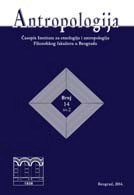COVID-19 VS LEPROSY, THE PLAGUE AND SMALLPOX: FOUCAULDIAN PERSPECTIVE
COVID-19 VS LEPROSY, THE PLAGUE AND SMALLPOX: FOUCAULDIAN PERSPECTIVE
Author(s): Mladen StajićSubject(s): Anthropology, History of ideas, Politics and society, Culture and social structure , Health and medicine and law
Published by: Институт за етнологију и антропологију
Keywords: Corona virus, epidemic; infectious diseases; Michel Foucault; panopticon
Summary/Abstract: Relying on Foucault’s theoretical differentiation of three derived management models reflecting the historical and political response to the emergence of three infectious diseases, namely leprosy, the plague and smallpox, this paper will consider the manner in which the approach of health policy-makers in Serbia has changed before, during and after the introduction of the state of emergency caused by the outbreak of the SARS-CoV2 epidemic, largely following the ideal-typical description of these three models of confronting the infection. Starting with the idea of identifying and completely isolating those that are infected from the community for the purpose of preserving a “clean” society, typical of the period of the spread of leprosy, through the idea of introducing quarantine and monitoring mechanisms for the purpose of establishing a disciplined society, typical of the period of the spread of the plague, to the reliance on vaccination and abandonment of the idea of complete eradication of the pathogens, i.e., reliance on statistics and risk analyses for the purpose of long term understanding and curbing the epidemic, typical of the outbreak of smallpox, it is possible to identify significant similarities of these historical models with different stages in managing the crisis caused by the Covid-19 epidemic in the contemporary local context.
Journal: Antropologija
- Issue Year: 21/2021
- Issue No: 3
- Page Range: 9-22
- Page Count: 14
- Language: English

